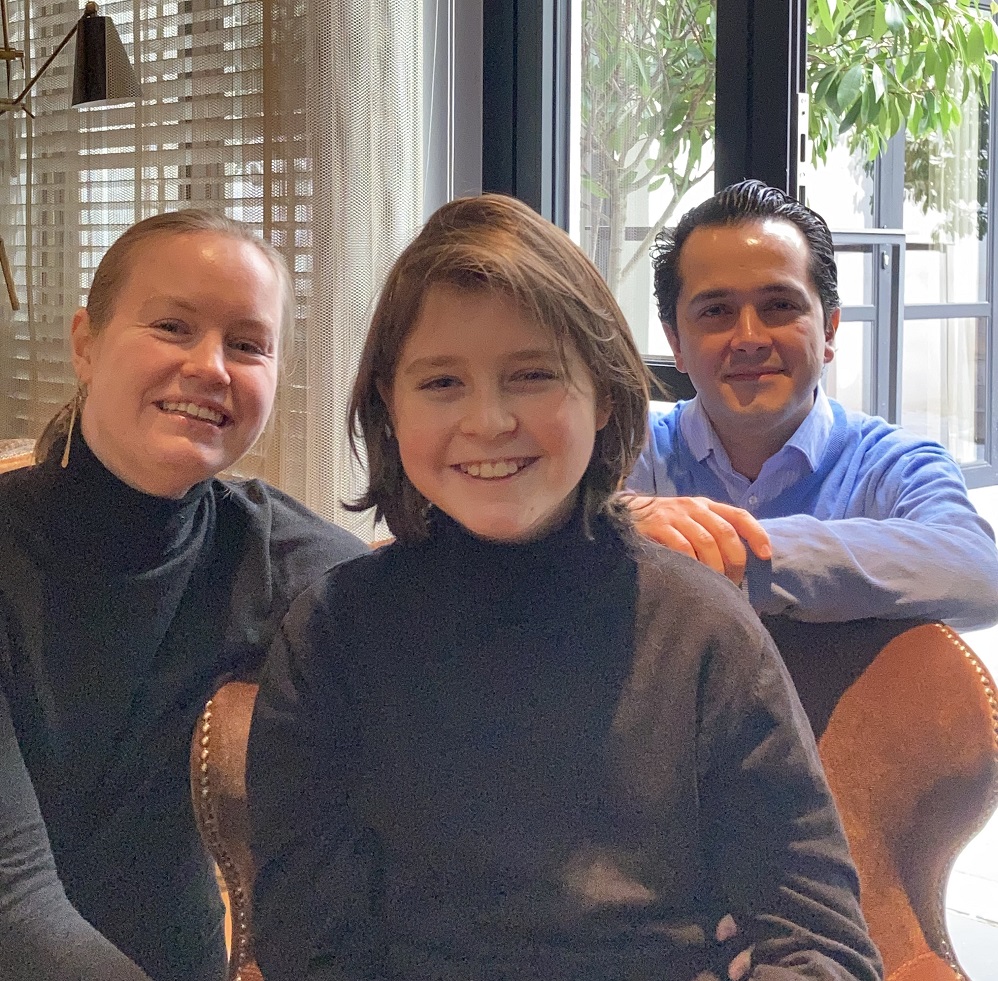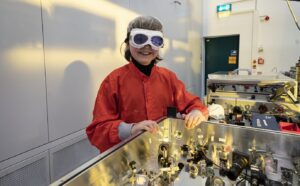It is fair to say that Laurent Simons is special. Last year, the 12-year-old child prodigy received his bachelor's degree in physics with distinction from the University of Antwerp, after completing the three-year course in just 18 months. It came after the Ostend-born boy had graduated from high school when he was eight years old.
These are extraordinary achievements by any standards, and they have generated attention from around the world: the doors of academia and industry are being flung open to him, while the world’s richest men are already offering to shower him with no-strings-attached money.
But the boy dubbed Belgium’s ‘little Einstein’ seems unflustered, even when billionaires come calling with cash. “I don't see what could be negative, I suppose,” he laughs, when we meet in Antwerp.
Could there be any downsides to accumulating massive wealth at such a tender age? "Nothing,” he laughs again. “The money can maybe be used to build a lab."
But does he feel he can make these decisions on his own? It is at this point that Laurent pulls back to underline that he is not even a teenager, let alone a legal adult. “I'm still a minor,” he says. “My parents need to take these decisions.”
A cure for mortality
Laurent’s parents, Alexander Simons and his wife Lydia, are cautious about their son. Of the offers they have fielded, he first came from IT giants in the US and China, who wanted him to study at their research centres. But they want the fruits of Laurent’s future research to benefit medicine. Laurent says his goal is to “extend life expectancy,” ideally by making humans immortal in the real sense, not the virtual sense.
The second wave, from billionaires, is harder to turn down. An offer from “one of the richest people in the world” is in play and might be accepted. This unnamed Asian billionaire says he simply wants to bring Laurent into his network, nothing more. It would give the wunderkind access to the world’s elite and places to stay as he travels the world researching ways to avoid ever having to depart this mortal coil. You can see why the super-rich want to keep him close.
Laurent is still adding to his qualifications. Now based in Antwerp, he sees himself as Belgian, though also grew up in the Netherlands and Marbella (where the Simons family has a house). In 2019, when he was just nine, he dropped out of a degree in electrical engineering at Eindhoven's University of Technology after a row over the schedule for graduation which would have made him the world's first-ever graduate under the age of 10. Instead, he took physics at Antwerp University.
His voracious appetite for learning is far from sated. In December he completed an internship at Germany’s Max Planck Institute, a two-month programme on quantum optics, where he began probing the intersection between physics and medicine.
Covid restrictions meant that chatting with the institute’s Nobel laureates took place in webinars and via email rather than in-person. Laurent can take in webinars while walking – which is what he was doing when we met in the lobby of Antwerp’s Franq hotel. Over his shoulder, I see a slide on his phone that reads: “Vortex unbinding transition in arrays of photon condensates.”
At Max Planck, Laurent has been working on “case control studies for colorectal cancer”. This involved comparing plasma samples from cancer patients with those of healthy individuals. “We trained a machinery algorithm so it can distinguish between the two,” he says. The goal is an early detection methodology for this type of cancer. He has enjoyed playing around with the institute’s lasers: they operate using a “very short pulse of 10 to the minus 10 seconds.”
Black holes and bosons
It’s complicated, but Laurent is clearly much more comfortable talking about his research than his personal life. Indeed, he says he is surprised to be asked it, and then apologises because, “I often get carried away and can't stop talking about science.”
As for his Master’s degree, also in physics, at Antwerp University, which he is due to complete in a little over one academic term instead of the standard two years, this has been an exploration of “the analogy between boson states and black holes”. Boson particles, Laurent explains, exist at ultra-cold states, almost absolute zero, or one billionth of a kelvin. They are neither solid, liquid nor plasma but enjoy their own state: a Bose-Einstein condensate.
“Black holes can be simulated; light can only go in but can never escape…but, of course, black holes are very inaccessible,” he says. Laurent is theorising similarities between a black hole and a Bose-Einstein condensate in a laboratory.
“There is a property of black holes: Hawking radiation,” he continues. “Quantum-mechanically, black holes are not black. They emit radiation, but the radiation has a very low temperature, so it’s hard to measure. The Bose-Einstein condensate is different. The radiation has a higher temperature you can measure. How do you measure it? By density changes.”
“This Hawking radiation has never been measured but has been theoretically predicted and it can lead to great consequences,” Laurent says. “We can maybe prove that Hawking radiation exists, by simulating Hawking radiation in the lab.”
My brain is already exhausted just listening to him. Meanwhile, Laurent’s parents –father a dentist, mother an office manager – have switched off. Their son surpassed their scientific knowledge long ago.
Missing out on fun?
Next on the schedule is a short holiday – possibly Japan – after which Laurent will present his Master’s thesis and plough on with his doctorate, probably physics again, followed by more research in chemistry, medicine and AI. “I want to combine these subjects to reach my goal which is of course to extend human life,” he says.
Is immortality theoretically possible, I ask? “I don’t think you can theoretically simulate that.”
Are there any downsides to immortality? If you live forever, would you enjoy life as much? “I think this is something for a later stage, if it’s possible,” he replies. Immortality would be “optional”.
Mum and Dad chime in: they would definitely take an immortality pill invented by their son. Laurent, however, has paused now. He admits he hasn’t thought through the ethical questions. The immortal would have to “watch their loved-ones die,” he recognises.
What is the secret to Laurent’s success? He was raised to a large extent by his grandparents, who simply noticed how bright he was. At school, Laurent was given the chance to skip years, and it snowballed from then. There was no real Eureka moment.
A psychologist tells me that gifted children often suffer because of “the gap between what they understand intellectually and the emotional maturity necessary to integrate this knowledge”, a gap that can play havoc with their “social relations”. I put this to him.
“I think I’m having more fun than other children,” Laurent replies, “because other children need to be there from eight until five o’clock, at school, and then they have homework and exams…very busy…I have freedom. I have much more freedom.”
He does have some interests that match those of other kids, including Marvel superheroes: he is a fan of Ironman, Spiderman, Captain America, the Hulk and Black Widow. By contrast, Superman and Batman “suck”.
Does he feel under pressure to study? Does he have to study subjects that he doesn’t enjoy? “During my bachelor’s there was a stupid ethics course, but it was only one course. Now with the Master’s, it’s much more fun as I can choose my own subjects,” he says.
Laurent’s fluent English is primarily the result of exclusive summer school courses in Switzerland (run by Beau Soleil and Rosenberg). His father explains the decision: “I like Belgium, my wife likes Holland, but the world is English. If you don’t speak English, then you have a handicap.”
While raising a genius has until now been “easy”, things could get tricky. Laurent’s parents, or his grandparents, will be travelling with him for the next few years, but Laurent is expected to start travelling on his own from about the age of 16. “He is now interacting with another league of people,” Alexander says.
Having a son in the media spotlight has forced the family to become media-savvy. Laurent does not mention his vaccination status on his Instagram feed (88,000 followers), and constantly defers to his father before answering what he thinks might be questions with even the slightest political hue.
The family are practising Catholics, and future ethical questions will be referred to the Vatican, where Laurent “has very good contacts”, even arranging Laurent’s Max Plank internship. “You could use Laurent’s stuff for military use, and we don’t want that,” says his father.
On Instagram, Laurent talks of setting up a Youtube Channel to teach other children to become “financially independent from a very young age”. He says this was his idea, while his parents have drummed into that he must "help" other children.
When not studying quantum optics, he dabbles in stocks – and cryptocurrencies – after reading press articles on companies and their products. Confidence, or “momentum”, is more important than fundamentals, he says. He describes it as a “Dogecoin-is-nothing-but-people-just-like-it” strategy.
I ask if he is aware of the dangers posed by central bank money-printing, but he doesn’t know what I’m talking about. He is learning faster than almost everyone else, but there are still areas of ignorance.
After our chat, Laurent is allowed to take off his mask for some pictures –but only after his mother ensures his hair is presentable. I get five minutes before his father insists that the mask goes back on. “There are two Laurents,” his father says, “the scientist and the boy.”


